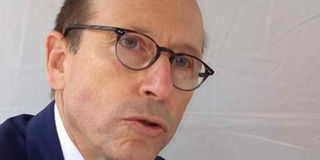How family venture is going strong two centuries later

Bollore Transport and Logistics Kenya Limited Country Managing Director Jean-Paschal Naud. PHOTO | OSCAR ANASWA
What you need to know:
- Bollore’s founder first invented a thin paper that proved popular with Bible printing. It later established a second company that manufactured cigarette paper. The establishment later grew to start producing special paper for capacitors.
- He says company owners must always be inventive enough to safeguard family interests in profitable ventures or else risk harming their generation’s future.
Starting and running a family business is not always an easy task. Many such ventures barely survive beyond a couple of years due to wrangles among family members regarding ownership and management.
However some family enterprises have stood the test of time and going on to thrive for decades and even centuries. A shinning example of such successful businesses is Global logistics firm Bollore which has been in existence since 1822 when it started off as a paper manufacturing firm under the directorship of Jean-René Bolloré.
Almost two centuries down the road, the firm is a global player with footprints in 105 countries and employing 36,000 staff.
The family-owned business is now in its sixth generation and its prospects look even brighter. Headquartered in Puteaux on the outskirts of Paris, France the company is set to get even more muscular as members have resolved to merge their transport and logistics global businesses to cash in on globalisation that favours one-stop shop for commercial activities.
The operations of the company span paper, energy, plantations and logistics. Its annual revenues, which is more than Sh1 trillion from its 500 companies spread across the world, is bigger than the budgets of some African countries.
In an interview with Money, Bollore Transport and Logistics Kenya Limited Country Managing Director Jean-Paschal Naud said they have managed to remain a single entity by living the vision of the founders who foresaw a business that would be handed from one generation to another. Unity of purpose, he says, is the cornerstone of the members in running the affairs of the company.
Each generation is also tasked with keeping the flame of the business burning brightly. This way, the family members honour the dream of the founders.
Such a firm foundation has protected the company from falling victim to wastage, infighting and conflicting goals. This is a departure from the fate that invariably afflicts many family businesses that struggle to stay afloat when the founders die.
“Bollore’s original vision was that Bollore companies must be nurtured for more wealth and jobs for the common good of humanity. Anyone killing Bollore’s vision will go down in history as a pariah,” Mr Bollore said.
Certainly Kenyan companies can glean valuable lessons from Bollore’s rulebook. Over the recent past, disputes have been witnessed among family members over the management of their businesses.
Mr Naud has a piece of advice for family businesses: Company founders, he counsels, must be visionary enough to set “a larger than life futuristic picture for their children to pursue with zeal as a united front and not to entangle themselves in petty squabbles that reverse gains made by the founders”.
Inventive
He says company owners must always be inventive enough to safeguard family interests in profitable ventures or else risk harming their generation’s future.
“A balance is needed between a company’s leadership and capacity to re-invent its portfolio to ensure it remains relevant to the future,” he advises.
So how has the company reinvented itself to not only stay afloat but thrive in a fast-changing business environment?
Bollore’s founder first invented a thin paper that proved popular with Bible printing. It later established a second company that manufactured cigarette paper. The establishment later grew to start producing special paper for capacitors.
“All family members are involved in business. They are deeply involved and their core task is to make a name for themselves to be in the league of those who expanded the founder’s dream to set up more companies across the globe,” he said.
In an interview at their Nairobi headquarters for the African logistics hub, Mr Naud said while in the past family members ran different subsidiaries and units, they had opted to unite their operations into a global conglomerate to sharpen their competitive edge.
“Bollore was making profits with its tobacco paper factory but on looking ahead, they sensed danger and disposed it off before venturing into nylon paper packaging. But it retains its thin paper business that is used in advertising, pharmaceutical and beauty care among other industries in France and for export,” he said.
Mr Naud said Bollore’s family members deliberately sought to outdo one another by venturing into electric cars, media and banking as well as into ports, railways and logistics management across Africa.
He said Bollore had resolved to merge their four transport and logistics companies to position themselves as an end-to-end service provider.
The merger will bring together Bollore logistics with interests in France and Africa, Bollore Ports which has 21 harbour concessions and 16 container terminals globally, Bollore Railways managing 2,700 kilometres of railway linking five countries and Bollore Energy providing petroleum logistics.





